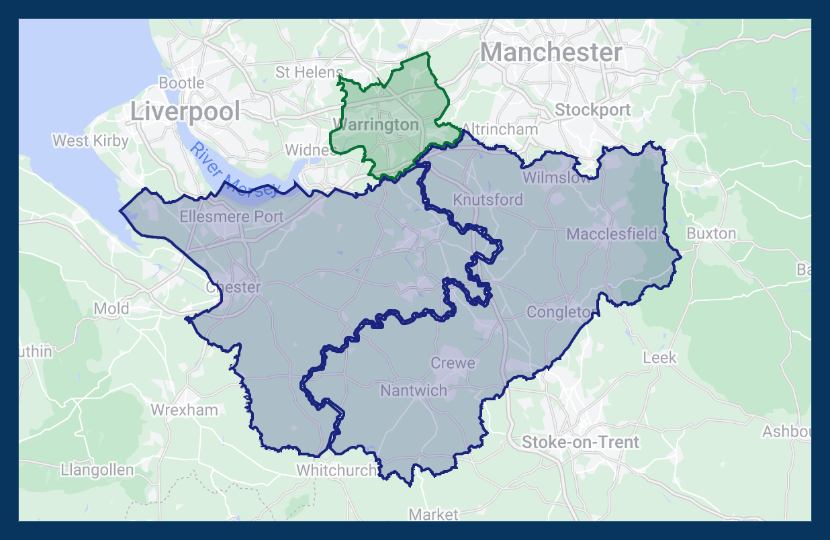
As discussions around devolution intensify, Cheshire must not be left behind. I am making the proposal for why a combined authority encompassing Warrington and a unified Cheshire Council, formed from Cheshire East and Cheshire West & Chester, is not just logical but essential.
Achieving a Level 3 devolution deal, which involves a combined authority governed by a directly elected mayor, presents an unprecedented opportunity for economic growth, job creation, and skills development in Cheshire.
The Government’s Levelling Up White Paper of February 2022 introduced a new devolution framework, extending devolution beyond metropolitan areas for the first time. This framework provides a flexible, three-tiered approach to devolution, with Level 3 being the most robust, requiring a directly elected mayor across a functional economic area or whole county area. The creation of a County Combined Authority under this model would significantly enhance local governance, allowing for more strategic decision-making and the consolidation of resources. This model is particularly pertinent for Cheshire, given the Government's stipulation that any devolution deal must cover a sensible functional economic area, which in Cheshire's case includes Warrington and the entire county area.
A combined Cheshire unitary council within the influential Combined Authority would streamline these operations further, reducing duplication of effort and enhancing strategic coordination. By bringing these councils together under a single governance structure, the potential for optimising resource allocation, standardising service delivery, and implementing region-wide initiatives—especially in areas like digital transformation, crisis preparedness, and infrastructure development—would be greatly amplified.
This unified approach would not only preserve but also enhance the collaborative spirit that has long benefited both councils, positioning Cheshire as a more robust and cohesive entity within the wider Combined Authority, capable of driving comprehensive regional growth and development. The two councils already collaborate extensively across various critical functions, including ICT, emergency planning, archaeology, archives, and transactional services. These shared services are managed under joint agreements, ensuring efficiency, cost-effectiveness, and consistency in service delivery across the region.
A Cheshire and Warrington Combined Authority is the right choice because it aligns perfectly with the functional economic area of the region, ensuring that economic strategies and public services are tailored to the specific needs of this interconnected area. Cheshire and Warrington already share strong economic ties, with complementary industries and infrastructure that naturally span the borders of Cheshire East, Cheshire West & Chester, and Warrington.
By forming a Combined Authority, these areas can leverage their collective strengths, attract greater investment, and deliver more effective public services, from transport to education and skills development. Additionally, the combined population meets the government's criteria for devolution, unlocking significant funding opportunities and powers that might otherwise be out of reach. The combined authority model allows for unified decision-making and strategic planning, ensuring that the growth and development of the entire region are coordinated and mutually beneficial. This approach not only enhances the region’s competitive edge but also ensures that all areas—urban and rural, affluent and developing—benefit from shared resources and a cohesive vision for the future.
A devolution deal promises substantial economic benefits. By consolidating resources and governance structures, Cheshire can attract more investment, improve infrastructure, and enhance public services. The example of Warrington, despite concerns about its significant levels of debt, demonstrates how strategic financial management and investment can drive economic regeneration. A combined authority would allow for the strategic planning of services across the county, ensuring that the economic potential of areas like Alderley Park, Macclesfield, Congleton and Crewe is fully realised.
There are understandable concerns regarding Warrington's debt levels. However, the structure of a devolved authority is designed to operate above individual councils, preserving local funding integrity and preventing the financial risks that some fear. By engaging proactively with the Government, Cheshire can shape a devolution deal that safeguards the interests of all constituent councils while driving regional growth.
The economy of Cheshire stands to gain enormously from a devolution deal. The combined authority, under the leadership of a directly elected mayor, will have the power to direct investment into key sectors, stimulate local business growth, and drive economic regeneration. This can translate into substantial job creation across the county, particularly in high-growth areas such as green energy, digital technologies, and advanced manufacturing. By capitalising on Cheshire's existing strengths, such as its life sciences hub and strong transport links, the combined authority can foster a thriving economic environment that not only attracts new businesses but also supports the expansion of existing ones. This approach will ensure that economic growth is inclusive and benefits all parts of Cheshire.
A directly elected mayor for the combined authority ensures accountability and a clear mandate from the electorate. This leadership model has proven effective in other regions—take Ben Houchen in Tees Valley or formerly Andy Street in the West Midlands—fostering decisive action and coherent strategies for regional development. The Government's latest devolution framework even introduced a Level 4 deal for Mayoral Combined Authorities, as seen in Greater Manchester and the West Midlands, which could serve as a future aspiration for Cheshire.
One of the most significant powers that this mayor and the combined authority will wield is control over skills and employability. By having the authority to tailor skills programmes to the specific needs of the local economy, the combined authority can ensure that the workforce is equipped with the skills that businesses in Cheshire need. This could include partnerships with local colleges, universities, and training providers to develop bespoke training programmes, particularly in high-demand sectors like digital technologies, engineering, and healthcare. Moreover, the ability to coordinate employability initiatives at the county level will mean that efforts to reduce unemployment and upskill the workforce can be more targeted and effective, leading to better outcomes for individuals and the economy as a whole.
Devolution isn't just about governance; it's about improving lives. More localised control can lead to better healthcare, education, and transport systems, fostering innovation and creating jobs, particularly in sectors like green energy and digital technologies. The devolution framework set out by the Government highlights these areas as key functions for devolved authorities, aligning perfectly with Cheshire’s economic strengths and aspirations. Additionally, supporting rural economies and communities within Cheshire will be a key focus in any devolution discussions, ensuring that all areas benefit from enhanced local control.
Rural communities in Cheshire stand to benefit significantly from the proposed devolution deal. By having more localised control, the combined authority can better address the unique challenges faced by rural areas, such as limited access to services, transportation, and digital infrastructure. Devolution provides an opportunity to tailor initiatives specifically for these communities, ensuring that they are not left behind in the broader push for economic growth and development. For instance, targeted investment in rural broadband, sustainable transport options, and support for local agriculture and small businesses could revitalise these areas, creating jobs and improving quality of life. Additionally, a more locally focused approach to rural development would allow the combined authority to work closely with community leaders and organisations to ensure that the needs and aspirations of rural residents are fully met, fostering stronger, more resilient rural economies across Cheshire.
Supporting the devolution deal for Cheshire is a step towards a brighter, more prosperous future. It aligns with the needs and aspirations of local communities, ensuring a responsive and effective governance structure. By embracing this opportunity, Cheshire can lead in regional development, setting a precedent for other counties to follow. The Government has already highlighted the significant funding available through devolution deals, with some regions securing up to £30 million annually for up to 30 years. Cheshire cannot afford to miss out on such opportunities, especially when neighbouring regions like Greater Manchester and Liverpool City Region are already benefitting from advanced devolution settlements.
To make the Combined Authority work effectively, Cheshire will need a mayor who is not only a visionary leader but also a pragmatic and collaborative figure. This mayor must possess a deep understanding of the unique challenges and opportunities facing both urban and rural areas within Cheshire. Strong communication and negotiation skills are essential, as the mayor will need to build consensus among diverse stakeholders, including local businesses, community leaders, and the councils that make up the CA.
A proven track record of delivering results and a commitment to transparency and accountability will be crucial to inspire public trust and confidence. Additionally, the mayor should be forward-thinking, with a focus on innovation, sustainability, and economic growth, ensuring that the policies implemented under their leadership not only address immediate concerns but also lay the groundwork for a prosperous and resilient future for all of Cheshire. This individual must also be adept at navigating the complexities of government to secure necessary resources and powers from the national level, all while maintaining a strong, grassroots connection to the communities they serve.
By uniting for a stronger, more resilient Cheshire, we can ensure that our county is not just on the map but leading the way in regional development. We now need to engage with the Government to secure a devolution deal that will deliver real benefits for the people of Cheshire.






